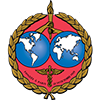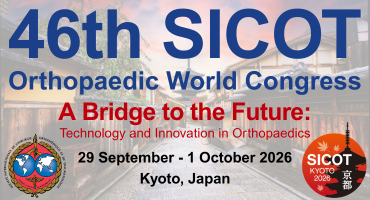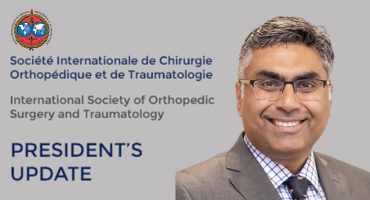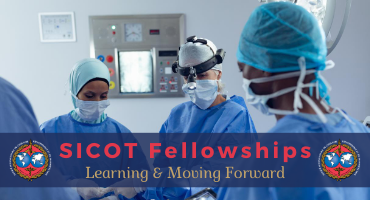Editorial
Human Factors in Surgery
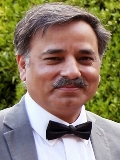 Anant Mahapatra SICOT Active Member - Dublin, Ireland |
It is time for us to chew, gulp, and digest the fact that human factors in surgery is an integral part of our training and practice as surgeons. Human factors in surgery aims to aid us in our goal to provide consistently high standards in our day to day practice while being forewarned with the knowledge that we work in a complex environment that challenges us in our pursuit to perform at our top level. We all know that as we go through our life as human beings we have our good days and our bad days. The whole issue of human factors in surgery revolves around the issues of our interaction with systems. As the definition of human factors goes: "Physical and cognitive properties of individuals are social behaviours which influence the functioning of the technical systems".
One of the best examples of human limitations has been measured with the response of humans to different levels of stress. Our optimal performance is only achieved when we find our comfort level of stress, i.e. where stress drives us to a higher level of performance but not into that level of exhaustion and ill health. It is essential for us to have this insight to enable us to protect ourselves from ill-health and help drive us to achieve greater accomplishments in our work. In Dr Yuval Harari’s book, A Brief History of Mankind, he describes the rapid rate at which humans grew to be the most dominant predator on the planet over a spate of only 40,000 years and homo-sapiens who started at the lowest part of the pyramid have conquered all the floor and fauna to arise at the top of the pyramid. The complex and ever-evolving human brain is that which has allowed us to grow from hunter-gatherers to be pioneers in the scientific and technological fields which now shape our world. However, human error is an inevitable by-product of this pursuit of success in an imperfect, unstable, and resource constrained world (Dekker 2003). When we analyse an environment, an organization, or even the management of a patient, we can sometimes conclude that small failures can lead to minor problems. This is not always the case. Human errors, technical or non-technical, can lead to major adverse events.
Over a period of the last few years the Royal College of Surgeons in Glasgow, Edinburgh, London, and Dublin have incorporated Human Factors into surgical training programmes. The aim of this is to develop trainees and surgeons who better understand the needs of the patients they interact with while also better understanding themselves and those they work with. The air traffic controller is the classic example of a person working at the top level of high stress, error free work which uses systems of checklists to maintain a free flowing end product of safely landed passengers in scenarios where human or technological failure leads to unacceptably catastrophic outcomes. We must learn from prior error without blaming or shaming anyone involved. By understanding human error, we can develop systems which incorporate checkpoints that allow us to prevent these errors from taking place. We should also develop a system in which the organization of the hospitals, surgeons, and the paramedical staff are supported in a way that they are able to give open disclosures about any untoward incident. Along with standard procedures and checklists these systems should allow us to achieve our goals of excellence in patient care in a better way.
Our ATLS training gives us an example of where the allocation of specific roles within a team allows us to achieve a shared goal. The nature of trauma scenarios is that they are high risk, highly stressful, and highly emotional for all involved. By training trauma staff to have a set role and to learn to communicate efficiently regardless of any chaos around them we can work as effective teams even in the most adverse situations. By demanding order where there could be chaos and teamwork where there could be confusion we can avoid people duplicating each other’s work and wasting valuable time. The Formula 1 pitstop team is another example of a team working together as a unit to quickly dismantle parts, re-build, and re-fuel the car in a matter of seconds. From the outside, one might see what looks like chaos. Look closely though, and one sees many individuals with set tasks working towards a set goal. Everyone has an allocated task to finish in an allocated time. There will be no repetition as the team works in a clockwork like fashion.
A major part of human factors is the form with which a surgeon awakens with. I am sure many of us can relate to the analogy of the surgeon who rolls out of the bed on the wrong side and through a series of small events ends up in a very adverse situation in theatre. This can happen to even the most experienced surgeons. It is all to do with the human mind and its form. On many occasions we have to understand that it is not only the players who are on a cricket field or on a football field who must be on form on a given day. Like it or not, surgeons are also human beings who have form on a given day and it is important to respect the inside strength that we have and listen to what your body needs. That is why the ancient Greeks say “Mens sana in corpore sano” or in a healthy body lives a healthy mind.
I would like to point to all surgeons, whether in training or who are at senior level, to look after their health from the point of view of when they are at the cold face they are able to produce the best results. Another major factor that comes to mind is that of patient-related outcome measures. As medical advances continue to improve patient outcomes I think we should rewrite some of these outcome measures. Take the case of the patient who climbs Mount Kilamanjaro after a total hip replacement. Where does he score on his patient-based outcome measures? In that situation the patient is without doubt expected to do much better. Recently at a meeting I had a chance to listen to Professor Kehlet who is a champion of an Enhanced Recovery Programme and he did mention that unfortunately the results of surgeries are also dependent on the mental health of the patient. He believes that this has come to the forefront of thinking in Scandinavian countries and Northern Europe as patients who have long winters of waiting around the corner have poorer results. The importance of this could be explored further in assessing the results of patients with mental health issues who undergo total hip or total knee replacements.
Surgeons like every other human being have a form!
